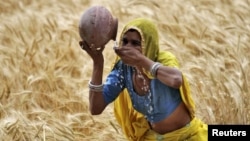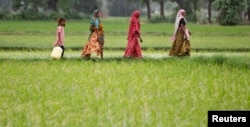Female farmers urged the Indian government on Wednesday to protect their land rights and keep them safe from abuse as women increasingly run farms abandoned by men for jobs in the city.
Women own just 13 percent of land in India, although they do two-thirds of all farm work, with ownership largely passing from fathers to sons.
"At a time when there is rapid feminization of Indian agriculture, the data need to reflect women farmers' work," Soma Parthasarathy of the women farmers rights organization Mahila Kisan Adhikaar Manch told the Thomson Reuters Foundation. "Women have the greater workload, yet their rights are more insecure."
Parthasarathy is among a delegation of women in New Delhi to issue the government with a charter of demands aimed at winning women equal status in land rights.
"Their names must appear in the land and cultivation records so they can finally gain a legitimate identity as farmers," she said.
As women's names are seldom on title deeds, the government labels them "cultivators" rather than farmers, which means they are denied loans, insurance and other state benefits.
"Our main demand is delinking land ownership from the definition of who a farmer is, as women are not recognized as farmers," said Parthasarathy, who is leading the delegation at the New Delhi meeting.
Widows lose out
India's constitution gives women equal rights but custom dictates that land is inherited by male sons. Women also seldom have claim over their husbands' land.
About 60 percent of India's population depends on the land, mostly farming and raising livestock and poultry on marginal plots of less than 2 hectares (4.9 acres).
The burden of caring for livestock and harvesting forest produce such as honey to supplement incomes also falls on women, Parthasarathy said.
"It is important that women get not just individual rights over land but also access to common lands, forestland and grazing grounds to secure their livelihoods," she said.
Legislators failed to pass a bill granting women equal rights to land, drafted in 2011 by the father of India's "Green Revolution," M.S. Swaminathan, to boost farm production.
Some states have programs to give land to the landless poor. But not all ensure women's names are on the titles, which means widows risk losing their farms when their husbands die.
"The system itself is not geared to protect a woman farmer's rights," Parthasarathy said.






